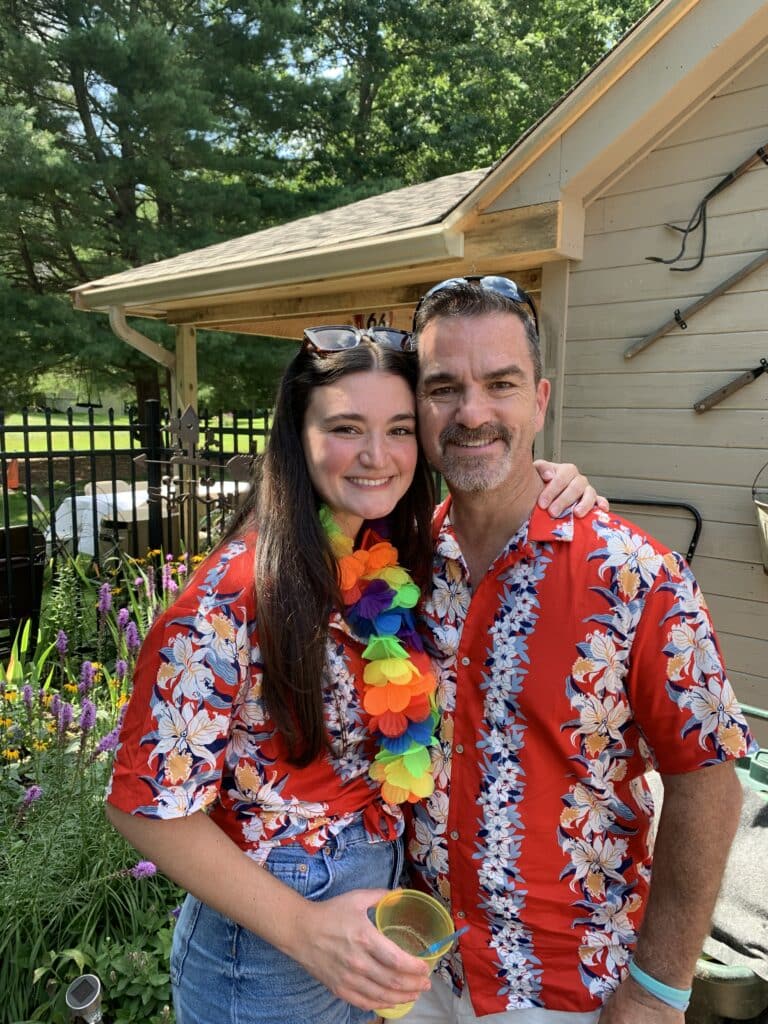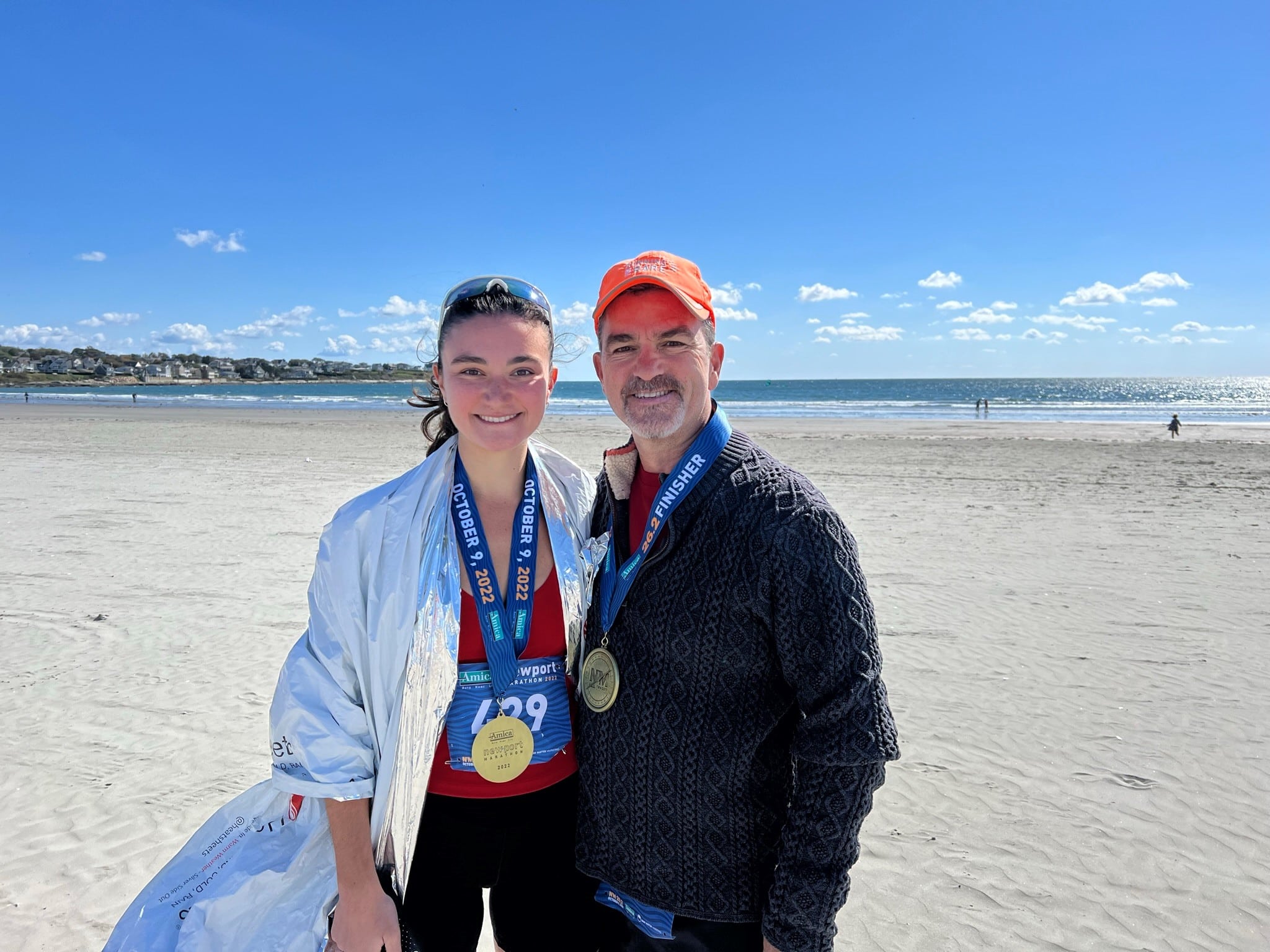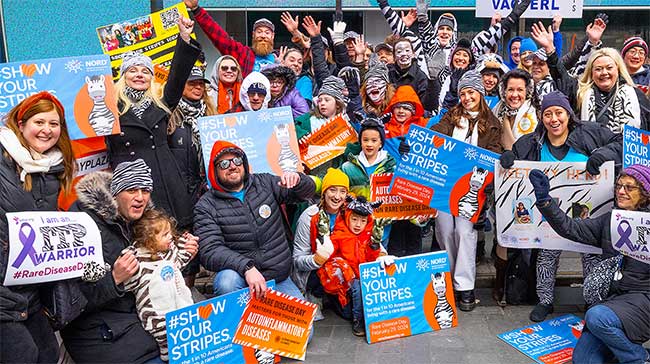With Phillip Maderia and his daughter, Abby
Phillip, you were just honored at NORD’s Rare Impact Awards as the “Father of Running for Rare.” In your words, how did #Running4Rare get started?
PHILLIP:
I worked at Genzyme, a company very well-connected to the rare disease community. I was meeting most patients we treated. It was incredible to provide a life-changing therapy and be able to offer these patients a tour of the facilities.
I would run for fitness but didn’t enjoy running at all. I got coaxed into running a half marathon by some friends at Genzyme. Little did I know, I would experience what’s called a “runner’s high,” which led to me running the Boston Marathon the following year. It inspired me to do even more running for charity.
I didn’t know NORD at the time, but because they had been connected to the Patient Advocacy team at Genzyme, when I asked them at the time who we should support, my colleague suggested NORD. We had been considering a few different disease-specific foundations to support, but the patient advocates said, “Why not contribute to all rare diseases?”
If you looked at my Facebook in 2008, you would see a photoshopped picture of me running the Boston Marathon in a NORD t-shirt, actually taken in a parking lot. That’s how it all started. We all bought shirts – we were excited. We raised about $2,200 that year. There was just a magic created by doing that. We did it again in 2009, and that year it wasn’t just our Genzyme site that ran, it was all Genzyme sites.
Then, in 2010, I gave a tour to Rebecca Brooks, a patient with Pompe disease, and we went to dinner. That’s where I had the idea of creating rare “community partnerships.” We talked all through dinner about the possibilities. From then on, it was solidified that every runner would have a rare community partner, and that acceptance to the running team would signify a deep and passionate commitment to the rare community. Rebecca was my first Community Partner.
We overcame every challenge we faced because this community is resilient and determined to overcome no matter what – funding, weather, you name it. We’ve participated in many different marathons: Boston, New York, Hartford, Providence, etc.. In Providence in 2015, we had a team of over 100 runners. This was also the first time my daughter, Abby, participated as a runner. She was 16 at the time and ran the half marathon with her brother, who was 18.
Abby, how old are you now? And have you kept running?
ABBY:
I’m 24 now, and I have kept running! I ran both in 2015 and 2016, then took a hiatus, and picked it back up in 2021. My first full marathon was last May of 2022, with my Dad. I liked it so much that we did a second one in October.
This past April, I ran the Boston Marathon and raised $10,000 for the Boys & Girls Club of Boston. Next, we’re running the Marine Corps Marathon on behalf of NORD and two new rare community partners.
How did you react to your dad taking on this role as an advocate for the rare community?
ABBY:
We were involved in it from the beginning. Once they started bringing in Community Partners, starting with Rebecca, I began to meet members of the rare community who became very good family friends. Now, as a family, we all feel very close to the community. When we were younger, our dad would sign us up for kid’s marathons, and my brother and I both ran cross country in high school. So we knew we would be Running for Rare eventually.
I remember when we met Shauna Sperou, a Community Partner with Rothmund Thomson Syndrome, she was only 6 or 7 years old, and she spoke at our dinner that year. My dad stood her up on a chair and held the microphone for her. It was the most amazing speech in the world. It was so exciting to see such bright light from this person; she carried the room. We became close friends with her parents, and then a few years later I asked to become her running partner for the half marathon in Providence. I partnered with her in 2015. Since then, we’ve developed an even stronger relationship, and even went to her high school graduation party just last Sunday!
While in high school, my brother and I also met with NORD Executive Vice President Pamela Gavin and talked about creating Students for Rare chapters at our high schools. We put on Rare Disease Day celebrations for several years, which continued after we left. As part of those days, we spotlighted local rare community members and handed out lanyards to the students. At the end of the day, the lanyards weren’t tossed away; most kids kept them in their lockers or on their backpacks all year. They felt connected to the issue.
As a kid, I recognized how special it was that my dad paired his passion for running for his passion for helping others. Now that I’m an adult with a career of my own, I respect him even more for the example he set. It inspired me as I was choosing my own path. I now work at Vertex Pharmaceuticals (a NORD Corporate Council member). Neither my brother nor I truly realized until we became adults how passionate we were about the rare disease community.
Knowing that 1 in 10 people live with a rare disease, have you found now that you have more of a connection to rare disease, now that you know more about it?
PHILLIP:
What’s happened is that more people have been willing to share their diagnoses, which had often been invisible to us before. I had a former colleague reveal to me her diagnosis, and she went on to become a Community Partner.
What advice do you have for beginner marathon runners?
PHILLIP:
The advice I would give somebody who’s not a runner is, trust that you can do so much more than you ever imagined. And it’s baby steps. You’ve just got to sign up for that half marathon, tell everybody you know so you have a little pressure, then start practicing. Maybe you start by alternating running and walking, or try working with a trainer. And little by little, you’ll accomplish it. That’s my advice: commit to something you don’t think you can accomplish, and tell everybody about it.
Whenever my kids didn’t feel like going for a run, I said “just get to the driveway.” Once you do that, you’re already done. I use those words throughout my life and work now, “Let’s just get to the driveway.”
And remember, time isn’t the goal, ever; it’s the sense of accomplishment and sense of community.
If someone wants to run a marathon and is looking for a cause to support, why should they choose rare disease advocacy? Assuming they don’t have a family connection to rare, as you didn’t, when you started.
PHILLIP:
There’s something about the rare disease community that’s special and hard to describe. Virtually everybody you meet is just so warm, thoughtful, engaged, committed, and resilient. What you find is, with the running community, it’s all kind of similar. We like to talk about our obstacles and how to overcome them. So, it just made sense.
In terms of choosing to partner with a rare community member, there’s a magic to that connection that you have to give yourself permission to experience. And if you give yourself permission to understand that magic, it’s life-changing.
For the New York City Marathon this year, where we’re an established charity partner, because we have that visibility, about 75% of the running team members have a connection to rare diseases and sought us out because of it. But it’s not necessary.
Describe the experience of being a Community Partner? What are the responsibilities, and who benefits most from joining this program?
PHILLIP:
The first responsibility of the partnership is awareness: sharing stories and connecting communities. And the second priority is fundraising. That part is easy; when you’re making the right connections and telling the right stories, the fundraising really does come easy.
If there’s some skill you have – maybe you’re an artist and you want to donate a painting that’s going to be part of a raffle – that’s really great, but it’s not required.
When we first started the program, we had a blog. It’s got hundreds of pages of writing and stories from rare partners and runners. I have such pride in what we created there. Now, we tend to share stories and raise awareness over social media, and both partners can play a big role in that.
You don’t need to share a photo of yourself or reveal your last name if you don’t want to; it’s entirely up to your comfort level and how you feel you can best show up. Many times, the runner you’re partnered with can act as your storyteller and advocate, which can be a rewarding experience.
As for maintaining the partnership with your runner after the race, I have hundreds of relationships with rare community partners, some of which are indistinguishable from my family, and others that are just a text every now and then. There’s no prescription for what a partnership should be.
How many slots are you looking to fill for the Marine Corps Marathon right now?
PHILLIP:
We have about 30 spots left for the Marine Corps Marathon. The minimum requirement to raise is $2,500.
Phillip, what’s your vision for #Running4Rare? It’s been 15 years and over $2 million raised. What’s next?
PHILLIP:
If I had a wish, you look at programs like Team in Training or Foundations that are established at all of these big marathons. Here in the Boston area, the Dana-Farber Cancer Institute has a gigantic presence. What I want is for us and NORD to be registered as a charity partner at the Boston Marathon. We typically have about 10-12 runners there annually, but we want to bring many more.
I don’t want #Running4Rare to be something we have to sell to people. I want people to know it’s the place to be, and that the connections to be made here are like no other.
Alright, lightning round. Abby, give us 3 words to describe your dad:
ABBY:
Big-hearted, ambitious, and funny
Phillip, give us 3 words to describe Abby:
PHILLIP:
Committed, selfless, and joyful
Do you see more marathons in your future?
BOTH:
Definitely.
Lastly, how are you spending this Father’s Day?
The truth is, there’s really no such thing as Father’s Day or Mother’s Day when you have living grandparents. So we’re going to my in-laws’ house to celebrate Grandparents Day.
Do you want to get involved in #Running4Rare as a Runner or Community Partner? Join the Team Here.





